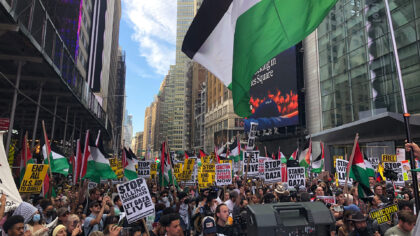Beautifying Cancer Patients in Gaza While Being Prevented From Life-Saving Treatment
Gaza Strip, Palestine — Forcibly displaced and suffering daily from breast cancer, 34-year-old Palestinian cosmetician, Samar Al-Jaal, finds joy in beautifying her cancer-ridden campmates using cosmetics. Samar lives in a tent with her young children in a camp with other forcibly displaced cancer patients in Gaza City.
Samar continues chemotherapy but the disease recently returned to her body and she continues to suffer. Unicorn Riot visited Al-Jaal as she worked on the faces of an elder and a youth in a wheelchair, both suffering from cancer. See her story in the video below.
Al-Jaal had hopes of obtaining a travel referral for medical care but she was rejected and has not been able to travel because of Israel’s war on Gaza.
However, she has a profession that she loves very much, cosmetics, and she uses her skills to beautify women with cancer inside the camp. “With the simplest tools, I try to bring joy to cancer patients,” said Samar.
Al-Jaal said, “I started this profession, despite my fatigue, because my husband was arrested by the occupation forces” and “I want to bring joy to cancer patients because I am a patient like them. And I suffer just like them; no one feels another’s pain like the one who experiences it.”
“When I work on them, they feel happy, they leave happily and joyfully. I love seeing them joyful, it fills me up with joy. Even if it’s a simple thing.”
Samar Al-Jaal
“I am like them,” Al-Jaal said, “I don’t have eyebrows. I feel happy when I work on their eyebrows.” Chemotherapy, a treatment for cancer that uses powerful chemicals designed to kill cancer cells, has a myriad of side effects, including hair loss. Each session of chemotherapy leads to further hair loss.
Beyond the suffering involved with having cancer, “psychologically, it worsens little by little with each chemotherapy session when you look at yourself in the mirror and see yourself,” said Samar. “Chemotherapy sessions are really hard. Every time I go, my health goes backward, and I’m a mother of seven children.”
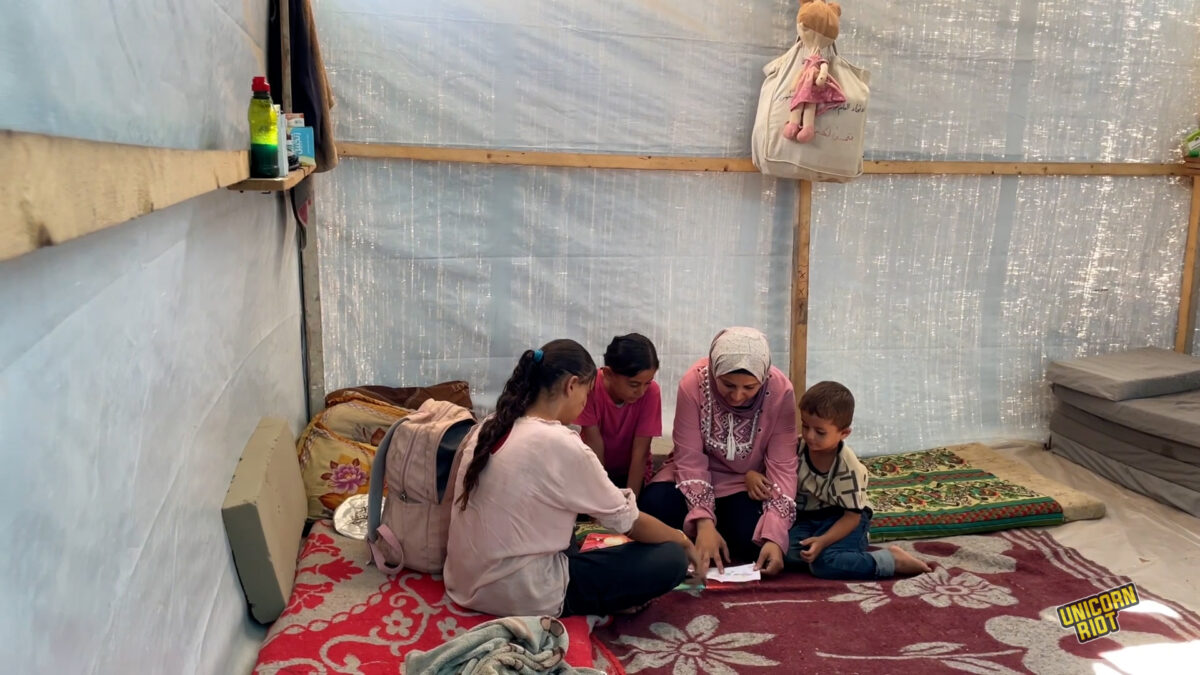
Al-Jaal said, “the whole camp is like a family. Thank God. I call them my friends, they are my friends in illness, my friends in struggle. Because we all feel for each other, as we are all patients.”
“She fixed my face and did my eyebrows,” said Maryam Al-Shibli after Samar colored her eyebrows.
Al-Shibli, another breast cancer patient, said she “felt at ease psychologically after seeing myself look somewhat normal … this disease has taken so much from me. It’s taken my hair and my breast. I had a mastectomy, but thank God. I try to take care of myself, even without the equipment.”
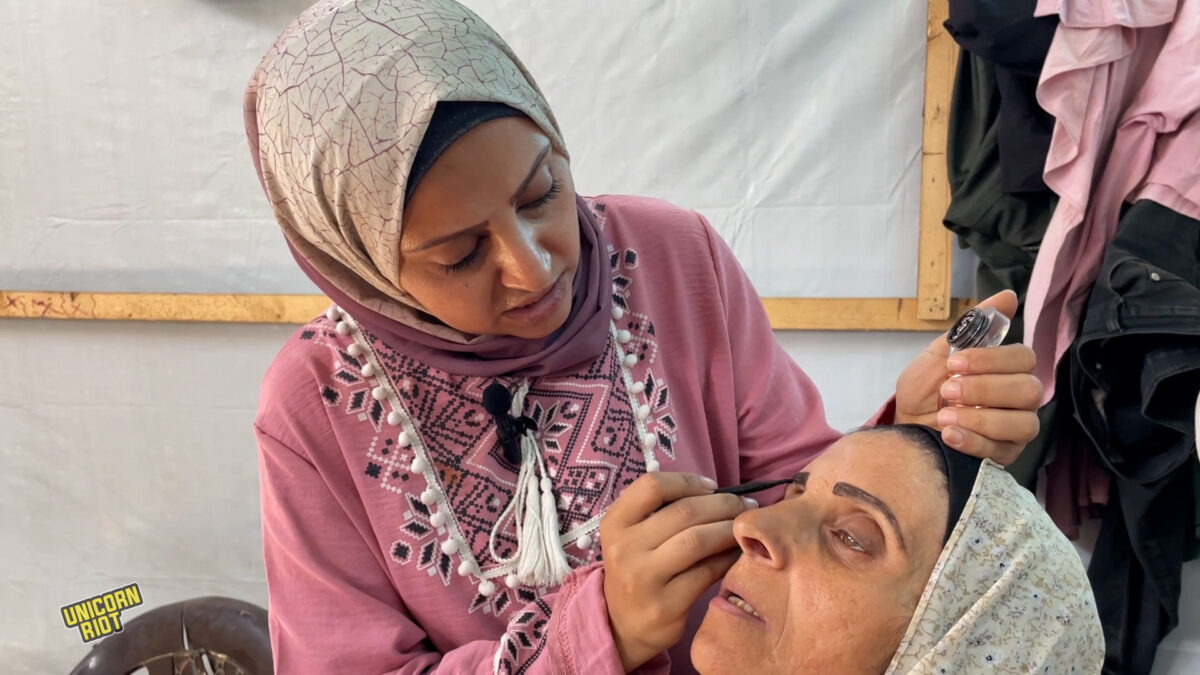
Without having access to needed medical supplies since Israel began its air, land, and sea siege of Gaza in 2007, healthcare in the Strip has fragmented and slowly deteriorated. Before Israel’s genocidal war on Gaza started in October 2023, there was an estimated 12,500 cancer patients within the Gaza Strip — a number likely much higher with cases often underreported.
There were only a few cancer treating hospitals before the war, including the Turkish-Palestinian Friendship Hospital, which was completely blown up and destroyed by Israeli forces in March 2025.
Because of the lack of specialized facilities and radiotherapy services, patients are forced to attempt to seek care outside of Gaza, in occupied East Jerusalem or neighboring countries.
However, this is extremely difficult as Israeli occupation forces severely restrict Palestinian people’s movement and residents in Gaza need to get travel referrals to leave the besieged enclave.
Referrals, if received, are rarely fulfilled because of Israel’s closure of all borders. Before the war on Gaza, 33% of 20,295 permit applications to travel were denied or delayed, increasing the deadly effects of cancer.

Breast cancer is the most common form of cancer and Palestinian women in Gaza and the occupied West Bank have just a 40% five-year survival rate, compared to a 90% rate in many countries.
Al-Helou Hospital is the only hospital that treats cancerous tumors in northern Gaza.
Unicorn Riot visited the hospital before Israel conducted their second invasion of Gaza City and bombed Al-Helou. Four patients who had been granted travel referrals but couldn’t travel due to the closure of the crossings spoke to UR, watch the video below.
Inside Al-Helou Hospital waiting to get her blood drawn, Najah Muhammad Mahdi said that she was cancer free to two years, until the war on Gaza started. “After the war, new cancerous growths appeared.”
“I was [cancer free] for two years. But recently after the war, new cancerous growths appeared … I don’t know, perhaps because of worries and anxieties, new small tumors like chickpeas appeared.”
Najah Muhammad Mahdi
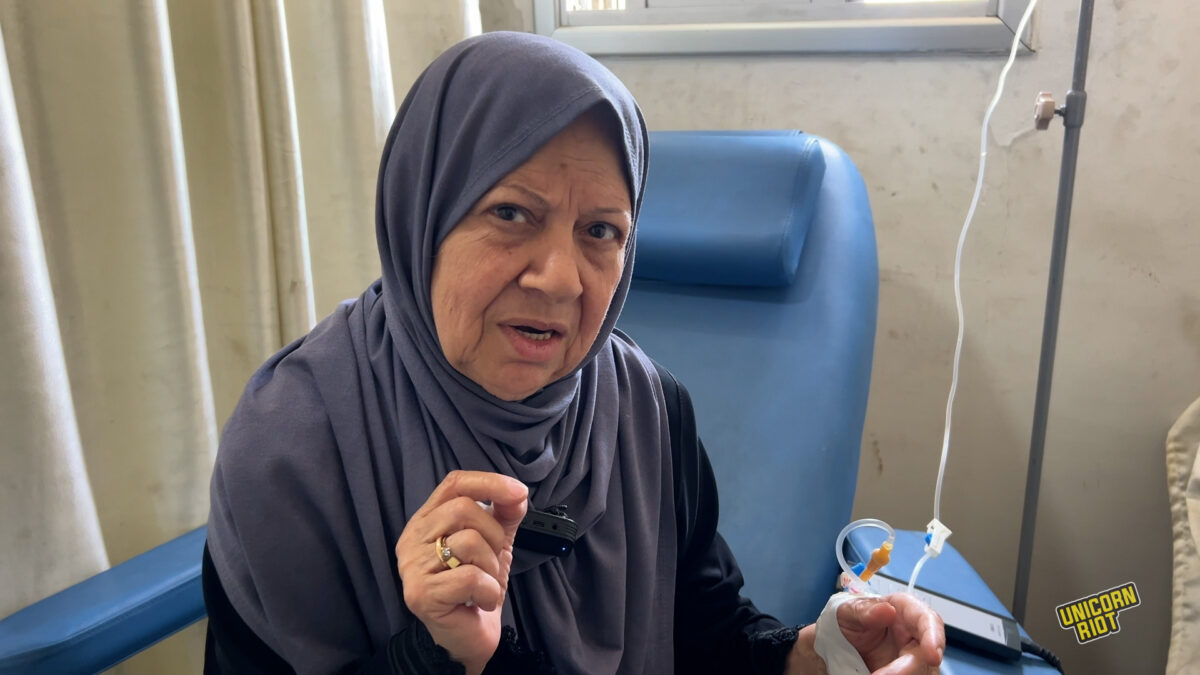
Bed-ridden patients Jamal Abu Watfa and Mahmoud Abu Wazna both spoke about the dire need for the war to stop, borders to be opened and for them to be allowed to travel out of Gaza.
Speaking through a tracheoesophageal voice prosthesis, Abu Wazna said, “if I were in a place without electricity, I’d die.” Mahmoud has throat cancer and said without treatment, his body is “on fire” and his bones feel like they’re “breaking down.”
“Cancer patients in Gaza have been suffering from the severity of cancer for many months,” said Abu Wazna. “The lack of medical resources and treatments has caused the disease to spread dramatically in our bodies. I have an urgent referral—Form No. 1, the first case. But because the crossings are closed, I can’t leave for treatment.”
“The closure of crossings means no treatment, no chemo. Today, we are supposed to take chemo. I need a third dose to ease my pain, but it’s unavailable. My body feels like it’s on fire. I feel my bones are breaking down without treatment.”
Mahmoud Abu Wazna
“There’s no treatment, no food, no drugs. The closure of the crossings has badly affected me,” said Jamal Abu Watfa.
Like Jamal and Mahmoud, Ziad Hamouda Dabban, has a travel referral to get treatment for colon and liver cancer and said that he’s been waiting for a call with an approval to travel for months.
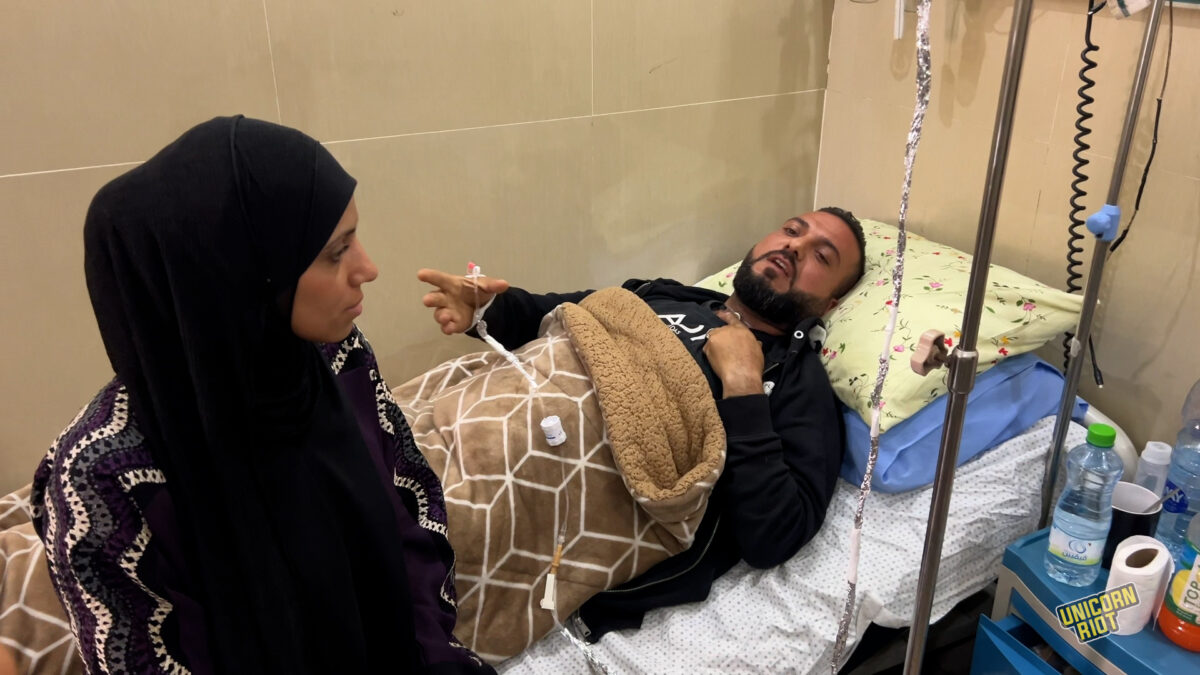
With the simple things like water, nutrition, fruit, and food being commodities that are hard to obtain in Gaza because of Israel weaponizing food and aid, people with cancer suffer negative impacts. Dabban said his illness “requires a person to get nutrition” and without vitamins and even “suitable food,” he’s suffering.
Despite being an international war crime against Article 19 in the Geneva Conventions, Israel has continually attacked civilian hospitals and healthcare facilities.
Israel has destroyed at least 38 hospitals within the Gaza Strip, and 197 ambulances while also targeting at least 96 healthcare centers. Nearly 800 Israeli attacks on healthcare facilities and staff have killed at least 1,670 medical workers.
The official death toll as of early October 2025 in Gaza is over 66,300 Palestinians killed by Israel since October 2023. The first independent survey of deaths in Gaza released in late June finds over 84,000 have been killed as of January 2025 and The Lancet analysis reported a death toll of at least 186,000 killed by Israel from October 2023 to July 2024, or 41% above official numbers. According to Israeli military intelligence, at least 83% of the Palestinian victims are civilians.
The United Nations said on October 1 that an average of 100 Palestinians are killed by Israel per day.
Help support Unicorn Riot contributor Mohamed El Saife as he seeks to get his family out of Gaza.
More media from Palestine linked in the image below.
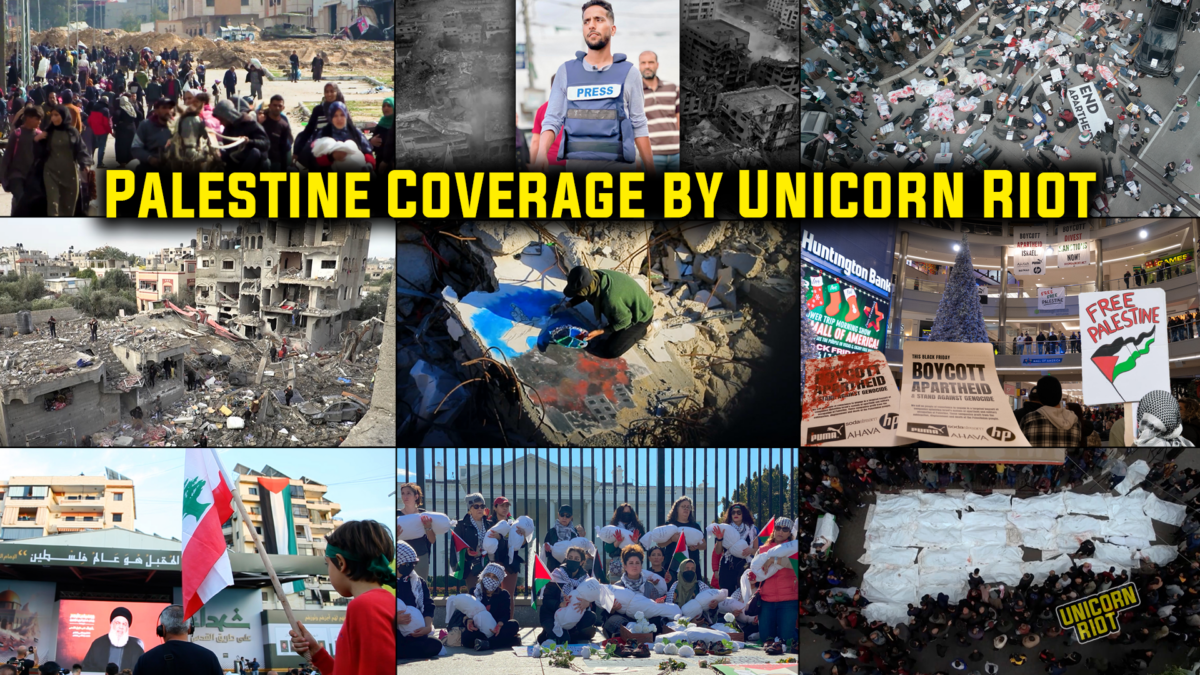
Follow us on X (aka Twitter), Facebook, YouTube, Vimeo, Instagram, Mastodon, Threads, BlueSky and Patreon.



